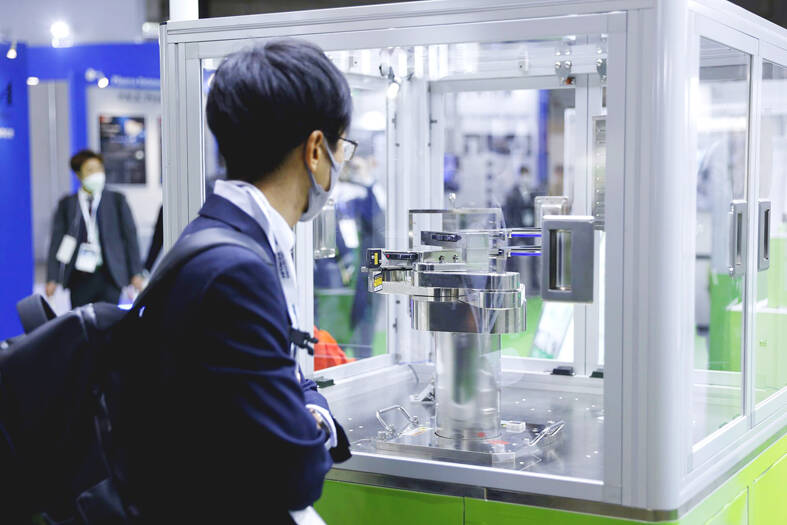Japan is poised to sharply raise its chip gear spending in an attempt to boost its position in the global semiconductor market, as it tightens exports amid a US-led push to limit China’s technological ambitions.
Japan is expected to spend US$7 billion on fab equipment next year, which would mark an 82 percent jump from this year — the largest in the world — according to data from SEMI, a global association of chipmaking equipment producers.
That compares with a 2 percent increase forecast for China and the total amount would be higher than the combined spending of the Europe and Middle Eastern markets.

Photo: Bloomberg
While Taiwan remains the largest spender — US$24.9 billion expected for next year — on chip fabrication equipment, Japan’s aggressive investment complements a US push to reconfigure global chip supply routes and sources.
Japan has long been a leading producer of equipment and materials necessary to make chips, and is now leveraging its position to woo major chipmakers such as Taiwan Semiconductor Manufacturing Co (台積電) and South Korea’s Samsung Electronics Co.
It is also tightening its grip on crucial equipment. Tokyo last week said that it would expand curbs on shipments of 23 types of cutting-edge chipmaking tools, including extreme ultraviolet mask testers, immersion lithography machines and silicon-wafer cleaners.
Japan’s goals include developing next-generation chips, such as solar panels used to harvest clean energy, that would galvanize its technology industry and economy, said Yeon Wonho, a supply chain analyst at the Korea Institute for International Economic Policy.
“Japan wants a breakthrough with chips,” Yeon said. “It wants to team up with countries like the US for joint research, while attracting manufacturing facilities to its soil.”
China remains a major market for Japan and the government denies its export controls target any particular nation.
However, the latest moves could restrict China’s access to advanced chipmaking technology, and Beijing has said such curbs threaten the stability of the global supply chain.
While Tokyo and Beijing seek to keep their relations stable, Japan has been a major ally in US efforts to keep China from advancing in key technology fronts like quantum computing, wireless networks and artificial intelligence.
The US contributes 39 percent of the total value of the global semiconductor supply chain, while its allies and partners from Japan to Germany account for another 53 percent, according to a 2021 report from the Center for Security and Emerging Technology, a Georgetown University think tank.
China holds about 6 percent, but is quickly developing its abilities across supply chains, it said.
Japan was a leading semiconductor seller until the 1980s, when it began to cede much of its market to Taiwan, South Korea and China. It now specializes heavily in supplies such as wafers — thin slices of material on which microcircuits are built — and other essential chipmaking gear.

Macronix International Co (旺宏), the world’s biggest NOR flash memory supplier, yesterday said it would spend NT$22 billion (US$699.1 million) on capacity expansion this year to increase its production of mid-to-low-density memory chips as the world’s major memorychip suppliers are phasing out the market. The company said its planned capital expenditures are about 11 times higher than the NT$1.8 billion it spent on new facilities and equipment last year. A majority of this year’s outlay would be allocated to step up capacity of multi-level cell (MLC) NAND flash memory chips, which are used in embedded multimedia cards (eMMC), a managed

CULPRITS: Factors that affected the slip included falling global crude oil prices, wait-and-see consumer attitudes due to US tariffs and a different Lunar New Year holiday schedule Taiwan’s retail sales ended a nine-year growth streak last year, slipping 0.2 percent from a year earlier as uncertainty over US tariff policies affected demand for durable goods, data released on Friday by the Ministry of Economic Affairs showed. Last year’s retail sales totaled NT$4.84 trillion (US$153.27 billion), down about NT$9.5 billion, or 0.2 percent, from 2024. Despite the decline, the figure was still the second-highest annual sales total on record. Ministry statistics department deputy head Chen Yu-fang (陳玉芳) said sales of cars, motorcycles and related products, which accounted for 17.4 percent of total retail rales last year, fell NT$68.1 billion, or

In the wake of strong global demand for AI applications, Taiwan’s export-oriented economy accelerated with the composite index of economic indicators flashing the first “red” light in December for one year, indicating the economy is in booming mode, the National Development Council (NDC) said yesterday. Moreover, the index of leading indicators, which gauges the potential state of the economy over the next six months, also moved higher in December amid growing optimism over the outlook, the NDC said. In December, the index of economic indicators rose one point from a month earlier to 38, at the lower end of the “red” light.

The global server market is expected to grow 12.8 percent annually this year, with artificial intelligence (AI) servers projected to account for 16.5 percent, driven by continued investment in AI infrastructure by major cloud service providers (CSPs), market researcher TrendForce Corp (集邦科技) said yesterday. Global AI server shipments this year are expected to increase 28 percent year-on-year to more than 2.7 million units, driven by sustained demand from CSPs and government sovereign cloud projects, TrendForce analyst Frank Kung (龔明德) told the Taipei Times. Demand for GPU-based AI servers, including Nvidia Corp’s GB and Vera Rubin rack systems, is expected to remain high,